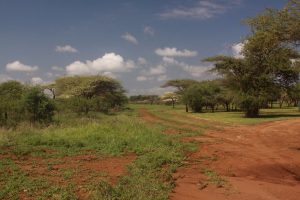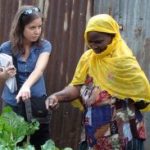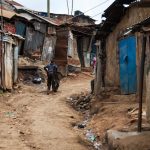 In a hot dormitory at the Olooloitikoshi Girl’s Rescue Center in Kenya, Jane inspects my arm freckles. She brushes her finger over my arm hair and traces my blue veins from the crook of my elbow to my wrist. I play, searching her arms and face for freckles.
In a hot dormitory at the Olooloitikoshi Girl’s Rescue Center in Kenya, Jane inspects my arm freckles. She brushes her finger over my arm hair and traces my blue veins from the crook of my elbow to my wrist. I play, searching her arms and face for freckles.
She examines my blonde hair and plucks strays from my shirt. She holds each one up to the light and giggles. I play, picking hairs from myself and placing them on her sweater, as if they were her blonde hairs.
“Do you want to be black like me?” she asks.
“Do you want to be white like me?” I ask back.
“Yes,” she says, her voice rising as she smiles.
“Why?”
“Because you are beautiful.”
“You are beautiful. I think the beauty is in our differences,” I tell her, trying to explain the age-old concept I have heard many times.
“It’s like how people in America want to come to Kenya and people in Kenya want to come to America,” I continue. “We want to go because it is different than what we know.”
“Yes,” she says, softer this time as she contemplates this idea.
She turns and chatters to her friends for a moment and then turns back to me.
“Silantoi,” she says. “Your Maasai name. Silantoi.”
I ask her what it means in English and she tells me: courageous. I wonder if I deserve that name, that acceptance from these Maasai girls. I wonder what I could have done to earn this honor. And I wonder how Eunice could ever deem me courageous.
That morning, I had heard bits of her young life’s story, scattered among the story of her two older sisters. And during my time at the Center, I would come to know more of her story. Her words would draw up images that made me wonder more and more each day: what is it about me that’s courageous in the eyes of this girl?
In January of 2010, at the age of 11, Jane fled her home with two of her younger siblings in a desperate move to escape their father. Just months before, her two older sisters, the oldest of 9 children, had left the home after enduring three years of abuse and threats from their father.
In the Maasai culture, it is custom for girls to be circumcised and married as young as 10 years old, long before they have the chance to finish their schooling. The girl’s father had threatened to have them be married and they refused for the sake of their education. Aside from this, he would often beat all nine of his children, especially the oldest two, in the head and face with stones or a cane. He would then make their mother clean the blood off her children.
“This is why I had children,” the girls said he told them. “So I could do whatever I want to them.”
After numerous refusals by the girls to marry, he threatened them at knife point and they ran away in December of 2009, eventually making their way to the Olooloitikoshi Girl’s Rescue Center.
In February of 2010, Jane lay sleeping, left home alone with her father and two of her younger siblings days before her scheduled circumcision. She woke up to her father staring down at all three of the children, whose clothes he had stripped off.
Bright and cunning, Jane told her father she was taking her siblings out to the bathroom. She grabbed clothes, locked her father in the house and left. After dropping the younger siblings at a neighbor’s house, she started her own journey: a two days’ walk over the Ngong Hills to her Great Uncle’s house.
After one night and one day of walking, Jane was found by a pastor herding his cattle. He called public transportation to take her to her Great Uncle’s, where she lived until being brought to the Olooloitikoshi Girl’s Rescue Center at the end of March of 2010.
Although I got on an Africa-bound plane when I was 21 years old to document the plight of Maasai girls and the strength of solutions, I have never trekked through the bush of Kenya alone. I have never been forced, beaten, threatened, or degraded. I have since learned more about female circumcision, early marriage, and the cultural contexts in which these systems operate. I have decided that it’s important to educate others about these issues and strive for understanding past their initial horror at the mention of them. But in these first days of hearing stories I realized that, just like girls in Kenya yearn for, I will grow up educated, choose my husband, and speak my mind often and without reserve. In a hot dormitory at the Olooloitikoshi Girl’s Rescue Center, they called me Silantoi for what is inevitable in my life: rights as a woman.
Author’s note: names in this story have been changed to protect the identity of the subjects.





Leave a Reply